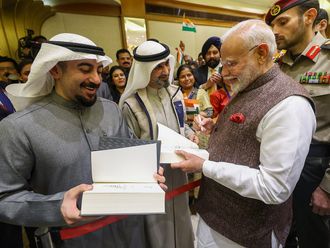Manama: Reports in Kuwait said that 43 people signed up on the fourth day of the registration process for the parliamentary elections scheduled for July 27.
The new hopefuls take the total number of candidates for the 50 green parliament seats to 179, including four women.
However, as Kuwaiti women cautiously take up their latest battle for parliamentary seats, the elections seemed headed towards a new chapter of suspense after two lawyers filed two separate petitions to the administrative court to have them reported.
One petition, filed by Adel Abdul Hadi, a lawyer, on behalf of a client, claimed the call for the elections on July 27 was not legally sound “as it was issued by a cabinet that had no such right since it did not include an elected member of parliament.”
Under Kuwaiti laws, the cabinet must have at least one minister who is an elected Member of Parliament.
In the current Cabinet, Dhikra Al Rashidi, the minister of social affairs and labour, is the elected MP who was voted in on December 1.
However, her parliamentary status was nullified in June after the Constitutional Court dissolved the parliament.
The lawyer argued that the cabinet, in the absence of an elected lawmaker, was not legitimate and that the approval of the Emiri to hold the parliamentary elections on July 27 was not legal.
The administrative court said it would look into the petition on July 7.
The second petition, filed by, Jasem Al Enezi, said the elections had to be postponed until after the Constitutional Court explained its landmark ruling on June 16 that dissolved the parliament, but upheld the decree that amended the controversial 2006 electoral law.
Under the amendment, voters could cast only one ballot instead of four as had been the custom.
The government said it was more in line with international principles and addressed all loopholes. However, the opposition said that it was meant to curb its powers and to ensure the election of a rubberstamp parliament.
The opposition said that it would once more boycott the elections, like it did in December, and urged Kuwaitis to keep away from signing up their names and from casting ballots.
Only two women had registered their names on the first three days as women seek to reinforce their political empowerment that saw them win four seats in 2009 for the first time in the country’s history. In subsequent elections, no woman won in February 2012 when conservatives and tribal candidates won by a landslide, but three women made it in December 2012 as several former lawmakers boycotted the polls.











